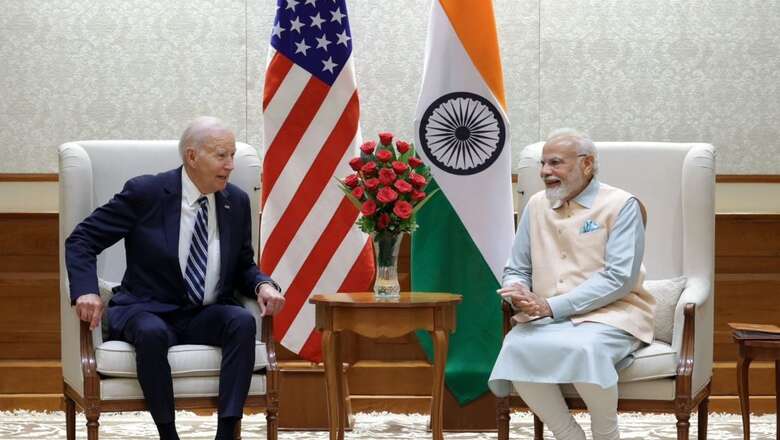
views
Global developments or foreign policies of countries do not follow calendar years. The transition from 2023 to 2024 has no meaning really in geopolitics. Countries do not make New Year resolutions to usher in a more peaceful world. Which is why the issues and problems that faced the world in 2023 will seamlessly spill over into 2024. What can be attempted at best is to follow the gamut of issues and challenges of 2023 into 2024, and how they may affect India.
The US will hold the presidential election in 2024. The run up to it is a long process within the two parties, and this will occupy the country politically at the domestic level, though of course foreign policy decisions will continue to be made, but with more of an eye on how they may affect popular support in a highly polarised and tight election. The growing instability of US domestic politics affects the rest of the world given the global role of the US. If Biden is considered too old and is seen as suffering from some cognitive issues and Trump is considered unpredictable and erratic, and the prospect of the latter’s re-election sends shivers down the spine of Europe, the Americans and the world can do nothing but to wait and watch.
The forward momentum of India’s relations with the US continued in 2023, barring the Pannun hiccup. Biden could not eventually accept India’s invitation to be chief guest on R-Day 2024, and the envisaged Quad summit had to be postponed. The next G7 summit in Fasano in Italy in June could be used to hold the Quad summit as Australia does get invited to G7 meetings. The UNGA session in 2024 could be another occasion to hold the summit.
At the bilateral level the agenda of India-US ties in various domains has been set, the stakes on both sides to build a stronger relationship in the political, economic and military domains have grown, and the US has shown a degree of pragmatism in dealing with issues on which the two sides are not in agreement. India has also widened its value as a partner by its more assured and self-confident diplomacy. Progress in India-US ties should continue in 2024, more so as the bi-partisan consensus in the US in favour of stronger India-US ties remains.
The Biden administration would ideally like to notch up some foreign policy success in 2024, but the outlook does not seem too bright. The US continues to send conflicting signals on Ukraine, both stating the limits of its weapons and financial support to Ukraine, and, at the same time, assuring that support will continue, with additional sanctions announced on Russia. The US has put itself in a position in which it cannot defeat Russia on the ground and cannot let Ukraine be defeated either.
Russia, which has weathered the sanctions at considerable cost, should be better placed in 2024 to deal with NATO’s proxy war against it in Ukraine. A war of attrition favours it, as Ukraine has suffered enormous losses in men and material and support for it in the West is waning. India-Russia ties will continue their trajectory in 2024, as an expression of India’s determination to foster them as part of a re-balancing of international relations.
External Affairs Minister S Jaishankar visited Russia end-December 2023, with a meeting with President Putin as an exceptional gesture. This reflects Russia’s own interest to keep India anchored in multilateral organisations like BRICS and the SCO seen as building blocks of a multipolar world, besides a more explicit recognition that India’s growing economic profile increases its attractiveness as a partner. The annual India-Russia summit is slated to be held in 2024 in Russia.
The Israel-Hamas conflict has also put the US in a difficult position. It cannot but support Israel for domestic and regional reasons, and, at the same time, it is intensifying resentments against itself in the Arab world, and even beyond, because of weapons supplies and financial aid to Israel when the latter is physically devastating Gaza and causing massive civilian casualties. The UN Secretary General has come out of his shell and is agonising over the human rights situation in Gaza. His appeals for a ceasefire are not being heeded, and the UN Security Council has shown its ineffectiveness once again with US vetoes.
The Israel government, which has extreme right–wing figures in it, is divided on its future plans for Gaza. US efforts to let Israel continue its cleaning up operation in Gaza but also appeal for limiting civilian casualties — disregarded by Israel — and make diplomatic efforts with Turkey and the Arab countries to prevent the conflict from becoming regional by Hezbollah and Iran joining the fray is not a coherent strategy if Israeli operations in Gaza continue. The US has made major naval deployments to deter Hezbollah and Iran, but with the Houthis now attacking shipping in the Red Sea area in response to the situation in Gaza, and the reluctance of Arab countries and some European ones to join the US coalition to counter these attacks, the situation has got complicated.
Will the exit of Prime Minister Netanyahu in the course of 2024 ease the situation? It is difficult to see how because extreme right– wing elements in Israel have an expansionist agenda even for the West Bank, and Israeli domestic politics is highly unstable, and faction ridden. A two-state solution is a convenient diplomatic position for external players to take, knowing that the hurdles to overcome to achieve that end have become almost insuperable.
India-Israel relations are strong but a loss of momentum in 2024 is inevitable. The Arab world, especially Saudi Arabia, will put on hold the Abrahamic Accords intended to normalise Israel’s ties with the Gulf countries and harness Israel’s strengths for their own economic and technological needs. India was part of this project through the mechanism of I2U2 (India, Israel, UAE and the US), as well as the India-Middle East-Europe Economic Corridor announced at the G20 summit in New Delhi. The disruption of shipping in Bab el-Mandep Strait by the Houthis will impose costs on India too, if not contained or eliminated. India is using its naval assets to protect the shipping lanes.
The Biden-Xi meeting in San Francisco in November 2023 was intended to obtain limited results on both sides, for the US to primarily to put guard rails against a military conflict over Taiwan, and for China to project itself in its new avatar as a peace maker and a mediator of conflicts, looking for win-win solutions, willing to play its role as a responsible member of the international community, and soften its image as an aggressive, expansionist power. This does not affect the basic policies of both sides at the bilateral, regional, and international levels. The presidential elections in Taiwan in 2024 could complicate the situation in the Indo-Pacific.
India’s own ties with China are unlikely to see any breakthrough in 2024. There is no peg on which improvement in ties could be hung. China’s policies on the border and in the neighbourhood will not change. India will continue to build its own economic and manufacturing capacities to steadily reduce dependence on China. With 30 countries wanting to associate themselves with BRICS in one form or another, including Pakistan, the expansion of BRICS under the Russian presidency will present a challenge to India’s diplomacy as Russia and China would seek to steer decisions with geopolitical ends in view. Both countries see BRICS as an organisation to counter the West’s traditional hegemony, a goal India shares in order to increase the voice of the Global South in international governance and reform the existing international political and economic institutions, but in a cooperative rather than in a confrontational framework, as India’s relations with the US and Europe will continue to be strengthened in 2024.
Elections in India in 2024 with an expected Modi/BJP win will, of course, have an important bearing on India’s international projection, given India’s ambitions.
Kanwal Sibal is a former Indian Foreign Secretary. He was India’s Ambassador to Turkey, Egypt, France and Russia. Views expressed in the above piece are personal and solely that of the author. They do not necessarily reflect News18’s views.
















Comments
0 comment